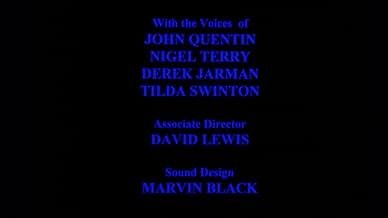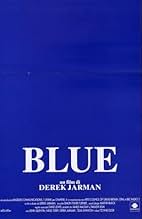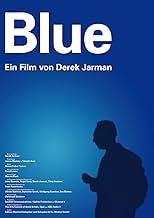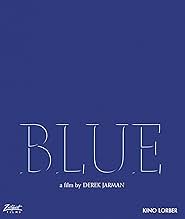IMDb RATING
7.3/10
3.1K
YOUR RATING
In his final - and most daring - cinematic statement, Jarman the romantic meets Jarman the iconoclast in a lush soundscape pulsing against a purely blue screen, laying bare his physical and ... Read allIn his final - and most daring - cinematic statement, Jarman the romantic meets Jarman the iconoclast in a lush soundscape pulsing against a purely blue screen, laying bare his physical and spiritual state.In his final - and most daring - cinematic statement, Jarman the romantic meets Jarman the iconoclast in a lush soundscape pulsing against a purely blue screen, laying bare his physical and spiritual state.
- Awards
- 2 wins & 1 nomination total
Derek Jarman
- Self
- (voice)
- …
Tilda Swinton
- Narrator
- (voice)
John Quentin
- Narrator
- (voice)
Nigel Terry
- Narrator
- (voice)
- Director
- Writer
- All cast & crew
- Production, box office & more at IMDbPro
Featured reviews
There is nothing I can write here that hasn't been written before about this film. A masterpiece. A seemingly 'dull' film. A brave and courageous final farewell from a great man.
Art for Arts Sake? Ars Gratia Artis? No. Absolutely not. This is a film made by a dying man while practically on his deathbed. His sight robbed of him, what more could an experimental film-maker do?
A powerful script telling of his life ('I'm sitting in a cafe....'), the things around him (the cyclist who nearly knocks him over to then hurl abuse at him), his lifestyle (I am a cock sucking straight acting lesbian man, I am a not-gay).
Jarman's Voice Over is the most provocative text about one's own death I know of. Of course, he knew he was dying. His doctors told him he was dying. He goes into graphic details of his medications, his symptoms, his pains. Never again can a film maker describe their own death in such a way, Jarman has done it and done it brilliantly.
The Blueness also plays a part. After a few minutes I felt angry, annoyed at having to stare at a screen of blue. I tried looking at the floor, closing my eyes, anything to avoid the blue. But I kept looking back.
A Masterpiece. Simple as that.
Art for Arts Sake? Ars Gratia Artis? No. Absolutely not. This is a film made by a dying man while practically on his deathbed. His sight robbed of him, what more could an experimental film-maker do?
A powerful script telling of his life ('I'm sitting in a cafe....'), the things around him (the cyclist who nearly knocks him over to then hurl abuse at him), his lifestyle (I am a cock sucking straight acting lesbian man, I am a not-gay).
Jarman's Voice Over is the most provocative text about one's own death I know of. Of course, he knew he was dying. His doctors told him he was dying. He goes into graphic details of his medications, his symptoms, his pains. Never again can a film maker describe their own death in such a way, Jarman has done it and done it brilliantly.
The Blueness also plays a part. After a few minutes I felt angry, annoyed at having to stare at a screen of blue. I tried looking at the floor, closing my eyes, anything to avoid the blue. But I kept looking back.
A Masterpiece. Simple as that.
Derek Jarman's final work is perhaps his most unusual. The visuals are nothing but a solid screen of bright blue. The soundtrack is a montage of sound effects, voice overs, and music. The dialogue is Derek Jarman's coming to terms with himself, and his terminal illness.
Some will find the whole affair a pretentious bore. Others will find it a moving farewell from a groundbreaking British film-maker who was completely blind by the time the film was completed. He broke the rules, especially with this film, and it's probably how he wanted to be remembered.
Some will find the whole affair a pretentious bore. Others will find it a moving farewell from a groundbreaking British film-maker who was completely blind by the time the film was completed. He broke the rules, especially with this film, and it's probably how he wanted to be remembered.
Not sure I could have made much of it without knowing at least a little backstory, and even then, it was somewhat hard to get a handle on at times. It is just 75 minutes of a blue screen, but the audio is surprisingly engaging, and there is some narrative to be found within it.
There's a good deal of spoken word, often poetic, and sometimes quite moving. Some of the snippets of music used here are also fantastic- not sure if they were sampled and if so where from, but they added a lot.
Despite the short length, had put off watching this for a while because I wasn't sure I was ever in the right mood for something this different and challenging. Even tonight, it wasn't the perfect movie for this very day, but at least now I'll know what to expect, and can maybe return to it on a day when I'm feeling like I could connect to it more.
But for the parts that did get to me, and the fact that it was an experiment that was mostly pulled off very well, a good deal of credit must be given.
There's a good deal of spoken word, often poetic, and sometimes quite moving. Some of the snippets of music used here are also fantastic- not sure if they were sampled and if so where from, but they added a lot.
Despite the short length, had put off watching this for a while because I wasn't sure I was ever in the right mood for something this different and challenging. Even tonight, it wasn't the perfect movie for this very day, but at least now I'll know what to expect, and can maybe return to it on a day when I'm feeling like I could connect to it more.
But for the parts that did get to me, and the fact that it was an experiment that was mostly pulled off very well, a good deal of credit must be given.
Losing his eyesight, Derek Jarman made this remarkable short
feature in which his diaristic reminiscences, and commentary on
his current degeneration from AIDS symptoms, are set against a
placid musical score and a cool, empty blue background.
An obviously simple idea, but what an amazingly rich one: Jarman
has created the closest movie experience to a director talking to
the inside of your head. The concomitant feelings of control-losing
peace and terrifying hallucination (one obviously starts to project
images into the blue blankness) are...well, so obviously apt, aren't
they? For a film about spirit, and about the interiorness of
everyone's reactions, BLUE is remarkably controlled in its effects.
It provides an experience adult viewers haven't had much since
childhood--of letting go and getting lost.
feature in which his diaristic reminiscences, and commentary on
his current degeneration from AIDS symptoms, are set against a
placid musical score and a cool, empty blue background.
An obviously simple idea, but what an amazingly rich one: Jarman
has created the closest movie experience to a director talking to
the inside of your head. The concomitant feelings of control-losing
peace and terrifying hallucination (one obviously starts to project
images into the blue blankness) are...well, so obviously apt, aren't
they? For a film about spirit, and about the interiorness of
everyone's reactions, BLUE is remarkably controlled in its effects.
It provides an experience adult viewers haven't had much since
childhood--of letting go and getting lost.
Many people complained about the triteness or cliche nature of the device of using an all-blue screen for the seventy-some odd minutes of this film. I'd guess that most of these people never saw the film on the big screen.
If you did see this on a big screen, however, you were sure to notice the tricks your eyes played on you. Jarman, directing this film as he lost his eyesight (and what could be worse for a director?), last saw the color blue. As you watch the film, your eyes become saturated with the color blue, and begin to try and compensate for the overstimulation, shifting to oranges, showing illusionary shapes in the blank field of the screen, and ultimately betraying you. What better allegory for the loss of one's vision, especially when it means everything to you?
If you did see this on a big screen, however, you were sure to notice the tricks your eyes played on you. Jarman, directing this film as he lost his eyesight (and what could be worse for a director?), last saw the color blue. As you watch the film, your eyes become saturated with the color blue, and begin to try and compensate for the overstimulation, shifting to oranges, showing illusionary shapes in the blank field of the screen, and ultimately betraying you. What better allegory for the loss of one's vision, especially when it means everything to you?
Did you know
- TriviaDerek Jarman went completely blind as a side effect of AIDS which is why this film is audio based. He died the year after its production.
- Quotes
Terry, Nigel: We've always been mistreated and the moment anyone gives us the slightest bit of attention we over-react with our thanks.
- ConnectionsFeatured in Derek Jarman: Life as Art (2004)
- How long is Blue?Powered by Alexa
Details
- Release date
- Countries of origin
- Official site
- Language
- Also known as
- Derek Jarman's Blue
- Production companies
- See more company credits at IMDbPro
Box office
- Budget
- £90,000 (estimated)
- Runtime
- 1h 19m(79 min)
- Sound mix
- Aspect ratio
- 1.85 : 1
Contribute to this page
Suggest an edit or add missing content
























